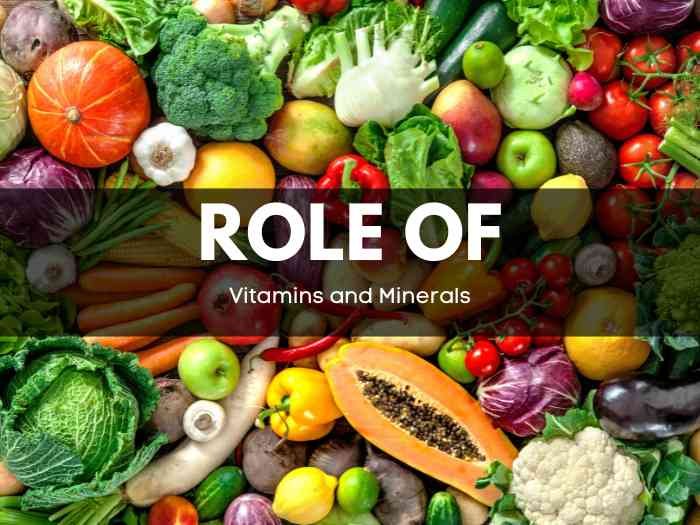Vitamins and minerals are essential micronutrients that play a vital role in maintaining optimal health and well-being. Often referred to as the “spark plugs” of the body, these tiny but mighty nutrients are involved in countless bodily processes, from supporting immune function and energy production to regulating growth and development.
What are Vitamins and Minerals?
Vitamins and minerals are essential micronutrients, meaning our bodies need them in small amounts to function properly. Unlike macronutrients, which our bodies can produce in limited quantities, we cannot synthesize most vitamins and minerals on our own. Therefore, we must obtain them from our diet.
Vitamins are organic compounds, meaning they come from living organisms like plants and animals. They play a crucial role in various bodily functions, including:
- Energy production
- Metabolism regulation
- Cell growth and repair
- Immune system function
- Nervous system function
Minerals are inorganic elements found in soil and water and absorbed by plants. Once consumed, they become essential for:
- Building and maintaining bones and teeth
- Regulating blood pressure
- Maintaining fluid balance
- Muscle function
- Enzyme activity
Understanding Vitamins: Key Players in Bodily Functions
Vitamins are organic compounds that the body requires in small quantities for various metabolic processes. They are classified into two main groups: water-soluble vitamins (such as vitamins B and C) and fat-soluble vitamins (including vitamins A, D, E, and K).
Vitamin A: Vision, Immune Support, and More
Vitamin A, also known as retinol, is essential for healthy vision, immune function, and cell growth. This fat-soluble vitamin is found in animal products like liver, eggs, and dairy, as well as plant-based sources like sweet potatoes, carrots, and leafy greens.
B Vitamins: Energy Powerhouses
The B-vitamin family, comprising vitamins like B1 (thiamine), B2 (riboflavin), B3 (niacin), B6, B12, and folate, plays a crucial role in energy metabolism, red blood cell formation, and proper nerve function. These water-soluble vitamins are found in various food sources, including whole grains, legumes, nuts, seeds, and meat.
Vitamin C: An Antioxidant Powerhouse
Vitamin C, or ascorbic acid, is a water-soluble vitamin renowned for its potent antioxidant properties. It supports immune function, collagen production (essential for healthy skin, bones, and connective tissues), and wound healing. Citrus fruits, berries, bell peppers, and leafy greens are excellent sources of this vital nutrient.
Vitamin D: Bone Health and Beyond
Vitamin D, often referred to as the “sunshine vitamin,” is unique in that the body can synthesize it from sunlight exposure. This fat-soluble vitamin plays a crucial role in calcium absorption and bone health, as well as supporting immune function and potentially reducing the risk of certain chronic diseases. Dietary sources include fatty fish, egg yolks, and fortified foods.
Also check: The Role of Nutrition in Mental Health
The Mighty Minerals: Essential for Optimal Health
Minerals are inorganic compounds that the body requires for various physiological processes. They can be classified into two groups: major minerals (required in larger amounts) and trace minerals (needed in smaller quantities).
Calcium: Building Strong Bones
Calcium is the most abundant mineral in the body and is essential for building and maintaining strong bones and teeth. It also plays a role in muscle contraction, nerve transmission, and blood clotting. Dairy products, leafy greens, and fortified plant-based milk alternatives are excellent sources of calcium.
Iron: Oxygen Transportation and Energy Production
Iron is a crucial mineral for the production of hemoglobin, a protein in red blood cells responsible for transporting oxygen throughout the body. It is also involved in energy metabolism and immune function. Lean red meat, poultry, legumes, and fortified grains are good sources of iron.
Zinc: Immune Support and Wound Healing
Zinc is an essential mineral that supports immune function, wound healing, and proper growth and development. It is found in various food sources, including meat, seafood, legumes, nuts, and seeds.
Potassium: Regulating Fluid Balance and Muscle Function
Potassium is a major mineral that plays a role in regulating fluid balance, muscle contractions, and nerve function. Bananas, avocados, leafy greens, and potatoes are rich sources of this essential nutrient.
Potential Deficiencies and Their Impact
While a balanced diet can provide adequate amounts of vitamins and minerals, certain factors, such as dietary restrictions, medical conditions, or lifestyle choices, can increase the risk of deficiencies. Vitamin and mineral deficiencies can have far-reaching consequences, ranging from fatigue and weakened immunity to more severe health issues like anemia, osteoporosis, and neurological disorders.
To prevent deficiencies, it is essential to consume a varied diet rich in nutrient-dense foods or consider taking a high-quality multivitamin/mineral supplement, especially for individuals with specific dietary needs or increased nutrient requirements.
Nourishing Your Body with Vital Micronutrients
Vitamins and minerals are essential for overall health and well-being, playing critical roles in countless bodily processes. By understanding their functions, food sources, and potential deficiencies, you can make informed choices to ensure you’re getting an adequate intake of these vital micronutrients. Embrace a balanced, nutrient-rich diet, and consult with a healthcare professional if you have any concerns about your vitamin and mineral intake.









